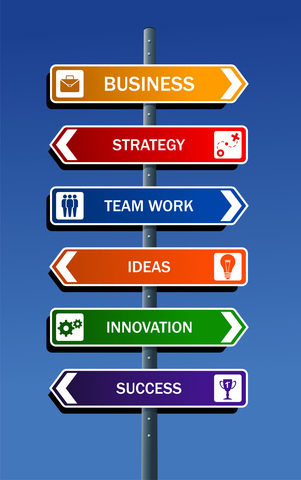Everyone has a skill or talent they’re known for and how it develops can be based on your family or the interests shared by friends. My uncle was a gifted pianist who loved melody and rhythm, which led to his love of literature and poetry. This later led to him becoming an English teacher.
In my case, my family nurtured my inner strategic thinker.
Yes, I freely admit it: I am a Strategy Nerd.
In fact, strategy—and solving difficult problems—IS my family business.
As a kid, sitting at the dinner table, I learned from the best—my parents. My mother joyfully shared stories such as how she used strategy to purchase a home, for her mother and extended family, just four years after she had completed high school.
My father figured out how to become the first in his family to attend and graduate college, and become a successful engineer.
Back in his youth, college was not necessarily in the cards.
For me, I started young. I figured out how to take all of the class requirements in high school before my senior year, so I could focus on what I wanted my college experience to “look like.” It included figuring out how I could move out of the nest to attend college instead of living at home to go college. That meant, passing on a car and taking the campus bus service to class.
And, before I earned my bachelor’s degree, I thought out and put in place a workable budget of time and money that I would require to complete my MBA.
That “gift” my parents gave me—the love of overcoming difficult challenges with a sound strategic approach—has definitely paid off in my professional life. And here, I share with you how I’ve successfully employed strategy—and business strategy—to solve my and my clients’ vexing business issues.
Chapter 3
In the first and second blog articles, I talked about my love of mysteries and the lessons they provide when compared to business challenges. Today, we’re going to delve into the topic of business strategy and the benefits of having one:
- What is a Strategy?
- What is a Business Strategy?
- Benefits of a Business Strategy
What is a Strategy?
Have you caught an interview with your favorite mystery writer and heard the interviewer ask about the writer’s process? Often what you’ll hear is the writer talk more about the structure of their day of when they write, conduct research, and edit their book. What you may not hear about as much is the strategy for writing the mystery.
Merriam-Webster defines strategy as:
“A careful plan or method for achieving a particular goal usually over a long period of time.”
Business Dictionary.com digs a bit deeper, defining it as:
“Method or plan chosen to bring about a desired future, such as achievement of goal or solution to a problem. The art and science of planning and marshaling resources for their most effective and efficient use.”
It goes on to provide the origin of the word strategy:
“Derived from the Greek word for generalship or leading an army.”
Each business owner is the general of their own business. Some owners have a written business plan and know when and how they will exit the business. Others have a bit of both—vision, mission, and an idea of what their first product is, but don’t have an idea about to get the product to market, an exit strategy, or how to grow the business. As a business owner, which scenario sounds like you?
What is a Business Strategy?
Michael Watkins, author of the Harvard Business Review article titled, “Demystifying Strategy: The What, Who, How, and Why”, argues business strategy is a set of “guiding principles” that provide a roadmap for decision making when they’re communicated and adopted throughout the company.
Harvard University Professor Michael Porter, who is known for his book, “Competitive Strategy”, would say a strategy is about choosing a competitive position in the market that differentiates your company from your competitors.
The guiding principles in the company are about what the company views as the business problem they’re solving. If you are CSX, are you a railroad company or are you a transportation company? If you said a transportation company, the business opportunities and longevity of the business are greater.
Have you seen the GE commercials? GE is reimagining their business strategy. A 100+-year-old company, they have exited the financing business and are selling their appliance manufacturing business. What’s left? A different company focused on the manufacturing business, where they’re integrating heaving manufacturing with the development of software solutions to deliver efficiency, insights, and savings for their customers. To play in this space, it has meant understanding their customer’s customer needs to develop the next generation of solutions.
Why Does a Business Strategy Matter?
Authors who outline their strategy for their mysteries know they have to keep their readers engaged to sell books. If they evolve their characters, add new ones, or changing the setting as Walter Mosely does by moving the Ezekiel “Easy” Rawlins character forward 10 years from the last book, they’re able to remain relevant with new problems to solve.
Businesses face the same challenges. A written business strategy is a living and breathing document every organization, whether a startup or a 10, 50, or 100-year-old business, needs.
The benefits of a business strategy include:
- Empowers an organization to take a long-term view, especially in times of uncertainty in the market where you need to hold on to what you have and sell what you have.
- Focus on working on your business, not just in your business by eliminating the confusion of focusing on tactics (in your business) and focusing on what business problems you solve (on your business).
- Enables proactive decision making, through guiding principles, as the business moves through the different phases of startup, growth, mature, and decline. Different strategies required for different stages.
- Provides a structured approach to monitor continually external and internal challenges, identify the organizational impact, and develop a proactive roadmap to address the challenges.
- Develop deeper insights about the customer to inspire creativity within your organization, identify new customers, and investment in new products and services to deliver revenue growth.
- Greater discernment about new trends before competitors see it and develop a strategy to respond.
- Early awareness of competitors, disruptors, and the potential sale of companies which create opportunities to respond proactively.
- Investment in processes, resources, skills, and capabilities to transform the organization.
- Continuous communication with employees and business partners ensures alignment on the strategy. External communication helps customers align themselves with the business problems you’re solving.
Treating business strategy as a process integral to a company’s survival and growth, it also provides you with choices. Wonder why one auto company had stockpiled cash two years ahead of the 2008 crash, while two others went bankrupt? One had choices; the others didn’t.
In our next post, we’ll explore what mysteries and a marketing strategy have in common. Let me know what choices a business strategy would enable you to make for your business. Leave your comment below or email us at info@renewablemark.com. Or pick up the phone to call—as strategy nerds, we’re ready to help you solve your business mysteries.
Carla A. Fleming is the Founder and Chief Strategist for Renewable Marketing, a marketing strategy firm. Contact us today to set-up a 30-minute Discovery Session and learn how we can help you cultivate your business.






You must be logged in to post a comment.